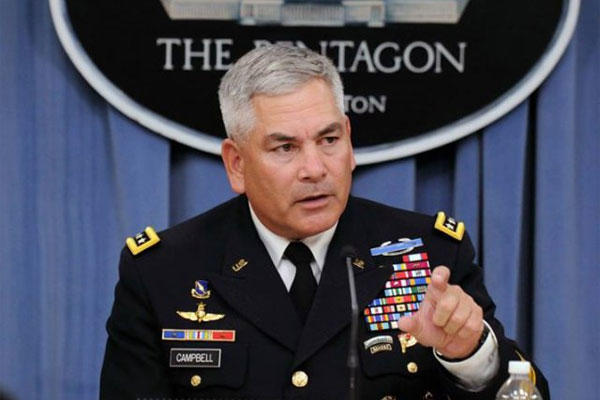Army Gen. John F. Campbell said Thursday that reports of a Taliban resurgence in Afghanistan as U.S. and coalition forces withdraw were exaggerated, although casualties for the Afghan National Security Forces (ANSF) have increased.
"There is no place that once the Taliban, or any other insurgents take over, that the Afghan military can't take that back from them," said Campbell, who took over as commander of the International Security Assistance Force in Afghanistan. "The Taliban don't own any ground."
Campbell said that reports from local Afghan officials that Taliban fighters had killed 150 people were "absolutely false."
U.S. Special Forces teams sent to the scene later reported that about six Afghan military and 12 civilians had been killed, and the Taliban had been pushed out of the area, Campbell said.
Campbell said similar reports of Taliban victories in Nuristan province and the Helmand province were also exaggerated.
"There is no territory down in Nuristan that the Afghans do not control," said Campbell, who made the same claims about Helmand.
[Asset Included(Id:7000023428834;Type:maComponent)][Asset Included(Id:7000023428834;Type:maComponent)]
"I think here in the next 24 to 48 hours what you'll see in Helmand is that the Taliban do not own any of the ground that they've tried to get and that they'll end the fighting season here very discouraged," Campbell said.
However, Campbell said that "we continue to have a tough environment" for ANSF and the coalition. He said that a recent spike in casualties for ANSF would likely put their number of killed or wounded at about the same or a slightly higher level this year as compared to last year, when 7,000-9000 were killed or wounded.
Despite the casualties, morale in the ANSF received a boost earlier this week when Hamid Karzai left the presidential palace and was replaced by the new administration of President Ashraf Ghani, with former rival Abdullah Abdullah as chief executive officer, Campbell said.
"There's a huge difference in attitude," Campbell said.
Karzai had repeatedly refused to sign a new Bilateral Security Agreement with the U.S. for a post-2014 U.S. troop presence and a similar Status of Forces agreement with NATO.
Ghani quickly concluded the agreements Tuesday, and Campbell said that the U.S. was now "on a good glide path" to transition from Operation Enduring Freedom this year to Operation Resolute Support next year. "I have no concerns on the retrograde," he said.
Currently, there are about 30,000 and 10,000 NATO troops in Afghanistan, and the plan was to have the vast majority withdraw by the end of the year, Campbell said.
By Jan. 1, Campbell said he expected to have a total of about 12,500-12,700 troops in Afghanistan, 9,800 of them from the U.S.
The troops would be based in train, advise and assist roles at Herat in western Afghanistan, Mazar-i-Sharif in the north, Jalalabad in the southeast, Kandahar in the southwest, and at Kabul and the major airbase at Bagram north of Kabul, Campbell said.
Under President Obama's plan, the 9,800 U.S. troops would be reduced by half in 2016 and all would be withdrawn in 2017 with the exception of Embassy security and an Office of Security Cooperation for weapons sales.
The signing of the new BSA raised concerns among top Republicans that the U.S. would withdraw too soon from Afghanistan and leave behind a government incapable of holding the country together, as Obama critics charged was the case in Iraq.
"While the signing of this agreement is a positive step, the administration should reconsider its plans to draw down U.S. forces completely over the next two years," House Speaker John Boehner, R-Ohio, said in a statement Wednesday, "Of all the challenges facing our strategy there, the most potentially damaging and completely avoidable is quitting just short of the goal line."
However, Campbell said "I'm very comfortable with the plan and the ramp for the drawdown. Afghanistan is fundamentally different than Iraq. You can't compare those two."
-- Richard Sisk can be reached at richard.sisk@monster.com






























